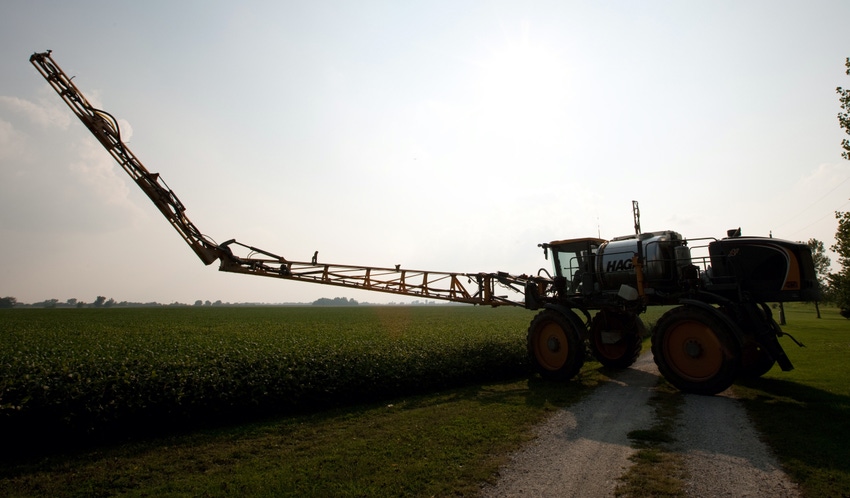
Having passed an April 15 dicamba spraying cutoff and multiple court challenges, the weather of recent weeks means Arkansas soybean growers are now facing a flush of pigweeds.
“I’m getting several calls from all over the state – ‘The pigweeds are up in our beans,’” says Tom Barber, University of Arkansas weed specialist. “We haven’t had a year in a while where the rains just stopped in the spring. We’ve had fairly wet springs the last several years and there’s been good opportunities for residual herbicide activation.”
Barber, who spoke on May 8, continues: “It is harder to manage pigweeds with just residual herbicides because they’re so environmentally-dependent and no rain, means no residual activity. Lately, rains have been spotty at best and currently there are only low chances of a shower or two in the next seven days.”
Jeremy Ross, University of Arkansas soybean specialist has also been talking to many concerned growers. “For the last couple of weeks, we’ve been on par for the five-year average for planting. The cold, wet conditions in April have caused some to replant. I’ve had several calls asking about minimum stands to keep.
“Because of the conditions, we have seen more seedling diseases – phytopthera, rhizoc and pithium. That’s especially true where there wasn’t a seed treatment.”
The spring has also “potentially set up for an SDS year because that fungus affects early-season beans in cool, wet environments,” says Ross. “We won’t really know if SDS will be a problem until the soybeans go into reproduction. At that point, there’s nothing we can do to pull plants out of the symptoms. There was a lot of talk a couple of years ago when SDS was bad in the state about fungicides and other products could cure the symptoms. Unfortunately, that just isn’t the case.”
There have also been a lot of worms and grubs in soybeans. “The worst of that, again, is where insecticide/fungicide seed treatments were not used,” says Ross.
Fighting pigweed
So, what has Barber been telling growers regarding the fight against pigweeds?
“Obviously, there was also a period in April when courts were involved and there was a lot of uncertainty about (the dicamba spraying cutoff date),” says Barber. “Many growers made the decision to return the LibertyLink soybean seed for Roundup Xtend seed prior to planting.
“The legal aspect, I believe, has since been cleared up for the time being with the Arkansas Agriculture Department releasing a statement on April 30 that dicamba regulations would be enforced in all counties and the dicamba cutoff was valid through Oct 31.”
Now, though, with Xtend beans planted in some fields, “pigweeds are coming up because we didn’t get rains to activate pre’s timely. Or, they may have gotten rains after the pigweeds had already come up.”
Due to the dicamba restrictions in Arkansas, the only option in such scenarios “is Roundup plus fomesafen, for the pigweed. An example would be 1.5 pints of Flexstar or 2.25 pints of Prefix (spiked) with six ounces of Flexstar to get the full allowable rate of fomesafen.
“If the pigweeds are up, we’ve got to get them small. Even they aren’t PPO-resistant and bigger than three inches tall, we don’t have a great chance of killing all of them. That’s where we’re at, timely applications are key to any success”.
As for PPO-resistant pigweed, “the higher percentage is in northeast Arkansas, although not every field is infested. Through our screening procedure it looks like approximately 50 percent of the samples we get in from northeast Arkansas (north of I-40 and east of the ridge) are PPO-resistant. Farther south and west it is not as widespread.”
It is true showers have been spotty and many times may not have provided enough rainfall for herbicide activation, says Barber. “However, in current temperatures if there’s moisture out there pigweeds can germinate. They don’t have to have a rain. And if the herbicides haven’t been activated they’ll come up. And once they’re up, you need an option to take them out post.
“We’ve been criticized for recommending Liberty because we have relied on Liberty for so long and it is a concern, but if you can’t spray dicamba legally there aren’t that many other post options in soybean, especially if pigweed populations are PPO-resistant.”
The state is growing more Enlist cotton which adds another option for pigweed control. “But because of the import approval issues with China, the Enlist bean acres are very limited,” says Barber.
Ross agrees. “If you don’t have LibertyLink planted and pigweeds are up, there really are limited options. In some pigweed areas, growers are going to come back in and replant with LibertyLink varieties.”
Despite all that, says Ross, “we’re okay with planting. We should get a lot of seed in the ground this week and next. We just need the weather to hold up for our farmers.”
About the Author(s)
You May Also Like




